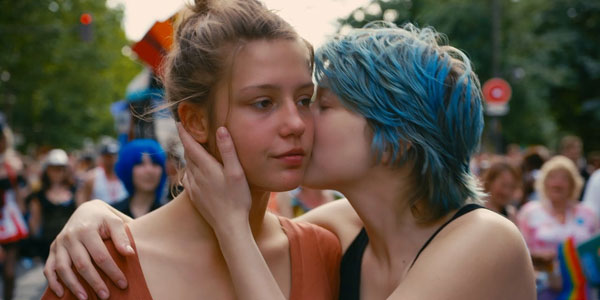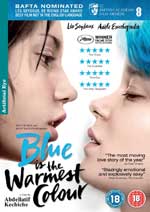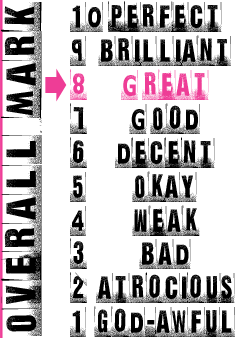
Director: Abdellatif Kechiche
Running Time: 179 mins
Certificate: 18
Release Date: March 17th 2014

Not many three-hour foreign movies arrive with as much adulation and controversy as Blue Is The Warmest Colour. With incredibly glowing reviews and the Cannes Palm d’Or in in its pocket, it then managed to gain extra notoriety due to a falling out between the lead actresses and the director over how difficult it was to work with him. The controversy was slightly manufactured as a few comments made about the intensity of both Kechiche and the how he makes his movies became a major bust-up in the press, which the director then made 10 times worse by taking it far more personally than it was ever meant to be.
And of course there’s the sex, which newspaper column inches would have you believe is just about the most explicit and lengthy romping there’s ever been on screen. It’s not, and to be honest while the scenes are quite long, if it had been between a man and a woman instead of two women I doubt it would have gotten a vast amount of comment. However lesbian things are still automatically shocking in the world of film, so if you make a movie that looks like two women might genuinely be enjoying sexual pleasure with one another, it automatically becomes something controversial.
The plot itself is relatively simple. Adele (Adele Exarchopoulos) is a French teenager who’s still at school. She feels like she doesn’t quite fit in and while she tries to date a boy, she knows she doesn’t feel the way about it she’s supposed to. After heading to a gay bar with her male best friend, she slips off and stops by a lesbian watering hole, where she meets blue-haired, fledgling artist Emma (Lea Seydoux).
A couple of days later Emma stops by Adele’s school, which marks the beginning of a relationship that sees Adele’s sexuality opened up by her new lover. The film charts their relationship as Adele leaves school behind and becomes an educator herself. While the love is all-consuming, their passion certainly isn’t easy.
You wouldn’t think it would be able to sustain a three-hour running time with such a seemingly everyday plot, but somehow it manages it. While the early parts drag a little, from about half an hour in it never gets close to being boring. In many respects it should be, as numerous times the movie comes close to falling into tedious pretentiousness. Lurking in the background is the sense that Kechiche wants us to know he’s an artist with a capital ‘A’, which occasionally threatens to overwhelm the film.
However he sensibly seems to realise that he made his best decision the moment he cast Adele Exarchopoulos, who puts in a truly extraordinary performance – or more precisely an extraordinarily ordinary performance. She is masterful at simply playing a real person, with the camera following her every move and expression – it sometimes feels like half the movie is close-ups of her face – where she draws us in and makes us feel for her simply because what she’s going through is so relatable and real.
This is a study of a relationship that many will feel reflects their own experiences of love and relationships. And thanks to Exarchopoulos and Seydoux the pain and emotion are laid bare, and done so in a way that eschews hyperbole and filmic artifice. These are people who are understandable, with all the contradictions and foibles you’d expect, not least that often relationships begin to falter when it turns out the person we think we want to be and who we present ourselves to be, doesn’t reflect what we really want in our heart of hearts.
Blue Is The Warmest Colour is remarkably absorbing, resulting in an ending that if you look at it objectively is incredibly low key, but it’s quietly devastating simply because you can perfectly empathise with the emotional undercurrent.
Oddly the much talked about sex scenes may actually be the weak link, as beyond their upfront presentation of two women enjoying each other’s bodies, they don’t actually feel quite as true as much of the rest of the movie. The lighting and camerawork feel far more stylised than everything else, so that while 90% of the movie takes you into the interior world of the characters, with the sex the film pulls back and you just watch.
Overall Verdict: Three hours slowly drawing out what is in many respects a relatively ordinary coming of age relationship doesn’t sound like it’ll be that interesting, but thanks to the film’s honesty and Adele Exarchopoulos’s astonishing performance, it’s remarkably absorbing.
Reviewer: Tim Isaac





Leave a Reply (if comment does not appear immediately, it may have been held for moderation)